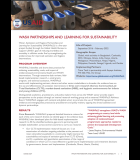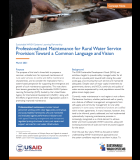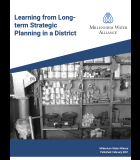Water Sanitation and Hygiene Transformation for Enhanced Resiliency (WaTER)
The pastoralist production system in Ethiopia, once a model of adaptive environmental balance, is under ever-increasing threat. Population growth, climate change, and policy trends are placing pressure on pastoralist communities, whose livelihoods depend on natural rangeland, placing them at risk to accelerating environmental shocks such as droughts. These vulnerabilities are exacerbated by the lack of services available in under-developed pastoralist areas. Pastoralist communities in Ethiopia exhibit some of the lowest water and sanitation coverage rates in the world. Building on considerable water, sanitation, and hygiene (WASH) experience in conflict-prone pastoralist areas, the Water, Sanitation, and Hygiene Transformation for Enhanced Resilience (WATER) project contributed significantly to improving pastoralists’ access to clean and sustainable water sources, hygiene awareness and access to sanitation, and rangeland management practices. Ultimately, project activities enhanced resilience and reduced conflict for beneficiary pastoralist communities in Somali, Oromia, and Afar Regions.
Activity Description
WaTER constructed 22 new and rehabilitated 19 existing borehole-based systems with corresponding distribution networks. Environmental health agents (EHAs) and volunteer community hygiene promoters (HPs) complemented the installation of these new and rehabilitated water systems with hygiene promotion activities in target areas. Hygiene education focussed on instilling the value of safe water as well as improving key risky behaviours. Drawing on expertise in sustainable water resource provision and natural resource management, the project worked to ensure that proposed water interventions were implemented through a conflict-sensitive approach that maximized local capacity to manage natural resources and minimizes environmental impact. The capacity building incorporated different approaches including training the local governments in dispute resolution, and building the capacity of the local community to take ownership and enhance engagement in the management of their environment for sustainability.
Expected Outcomes
- Increased access to improved water sources for beneficiary communities
- Improved hygiene awareness and access to sanitation among Beneficiaries
- Improved rangeland management practices
Actual Outcomes
- 221,504 beneficiaries have year round access to an improved water source
- Increased number of functioning water systems for human and animal use with 22 new boreholes drilled and constructed, and 19 boreholes rehabilitated
- 41 water systems are adequately operated and maintained by capable WMCs six months after hand-over
- Improved community hygiene and sanitation through health agents and volunteer HPs
- 41 natural resources management committees (NRMCs) are established or strengthened and trained to develop rangeland management plans.





